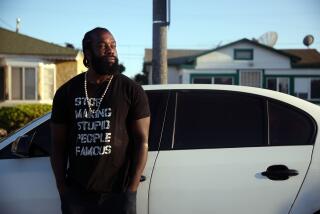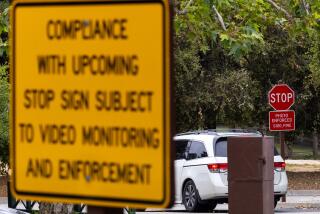Several Roads to Take After Traffic Ticket
- Share via
“You made an unsafe lane change,” the highway patrolman said as he wrote out the ticket.
At first politely, and then more vehemently, I told him the lane change was perfectly safe, but my protests of innocence went unheeded.
As I drove off, I swore I would see that officer in court and prove him wrong.
How do you fight a ticket you think you didn’t deserve? It’s not easy, but it can be interesting, unless you lose.
Alleged Violations Listed
Actually, the policeman did not give me a “ticket.” It is properly called a traffic citation. It lists the sections of the vehicle code that supposedly have been violated. It also tells you when you are required to appear for your arraignment--when you make your plea.
You should sign the citation. By signing it, you are not admitting you are guilty; you simply are promising to appear in court. If you refuse to sign, you can be arrested and taken to court or, if a judge is not immediately available, to jail.
After the police car drives off, look around for witnesses. Try to get the names, addresses and phone numbers of anyone who saw your alleged infraction. If you fight the ticket, testimony of an uninterested party could be vital to your defense.
Making Notes
Next, examine the location carefully. Check for traffic signs, traffic lights, potholes and anything that may have obstructed the officer’s view. At the site, or as soon as you get home, sit down and write a summary of what happened. Note such things as the lane you were in, the speed you were driving, the license plate numbers of other cars, what the officer said to you and the weather conditions. Weeks or months later when you have to testify in court, the comprehensive summary you prepare at the time of the incident will make it easier for you to remember and testify fully.
Unless you decide to post and forfeit bail--”pay the ticket”--you usually have to appear at your arraignment to enter your plea. Often, you can pay the ticket through your auto club. Forfeiting bail is treated as a conviction on your record.
Most municipal court judges will also accept a plea of “guilty with an explanation.” The conviction still will be on your record, so both the Department of Motor Vehicles and your insurance company will hear about it, but the judge may suspend the sentence or assess a lowered fine.
Depending upon previous citations, you may be able to request traffic school, in which case you will plead guilty. Once you have completed traffic school, the conviction will be withdrawn and the charges dismissed. The insurance company will never know.
In some courts, such as Van Nuys Municipal Court, you no longer have to appear at the courthouse to request traffic school. You can do it all by mail. The court sends out a notice telling of your right to attend; you can reply by mail, attend school and then mail in the certificate of completion. This procedure doesn’t take much time but traffic school lasts eight hours.
Judges and Juries
If you enter an innocent plea, the court will set a date for when you will return for trial. That means two visits to the courthouse to prove your innocence. Most traffic violations are considered infractions, so you are not entitled to a jury trial; a judge presides. If you are accused of reckless driving or driving under the influence of alcohol, you still may have a trial by jury.
Before you go to court, you should return to the scene, take a photograph and draw a sketch. Try to take the photo at the same time of day you were ticketed, especially if it is a time of heavy traffic.
Read the vehicle code section that you are accused of violating. Analyze it word by word and break it down into the various elements of the crime. Are you guilty of all of them?
In a law library or at the local DMV, check out related code sections. For instance, there is a basic speed law in California that says you should not drive faster “than is reasonable or prudent having due regard for weather, visibility” and so on. Even though you were driving faster than the posted speed limit, you may not have violated the law as long as you were not driving in excess of the maximum speed limit of 55 m.p.h.
Finally, on the big day, after waiting through countless other court proceedings, your trial will begin. If the police officer doesn’t show up, you win by default. If he does appear, your primary task will be to discredit his testimony. You will cross-examine him. Try to question the accuracy of his memory. You do this by asking all sorts of questions about what he was doing at or near the time he saw you, questions like:
Was your car radio on? What lane were you in? How many cars were between us? Were there any pedestrians in the area? (Wouldn’t it be great if he said no, and your next witness is a pedestrian who was there?) How fast were you going? How fast was I going? How do you know?
Be Prepared
If the officer has a lapse in memory, the judge will be less likely to believe him when he describes your violation of law. That’s why you must be well prepared for your own testimony, so the judge will believe you. The photographs and written summary should help, but it’s not a bad idea to rehearse what you plan to say.
It all sounds like a time-consuming, challenging process. Remember, I said it’s not easy. But when you know in your heart that you were right and the officer was wrong, it’s worth it, right?
If you win, you’ll be vindicated and your insurance rates won’t increase. On the other hand, if you lose--and officers can be pretty credible--the conviction will appear on your record and your premiums will increase.
With the appealing alternative of traffic school, it can be a tough decision.
Besides, you’ll learn something in traffic school, right? That’s what I told myself when I signed up for it.
And I’m a lawyer.
Attorney Jeffrey S. Klein, The Times’ senior staff counsel, cannot answer mail personally but will respond in this column to questions of general interest about the law. Do not telephone. Write to Jeffrey S. Klein, Legal View, The Times, Times Mirror Square, Los Angeles 90053.
More to Read
Sign up for The Wild
We’ll help you find the best places to hike, bike and run, as well as the perfect silent spots for meditation and yoga.
You may occasionally receive promotional content from the Los Angeles Times.






